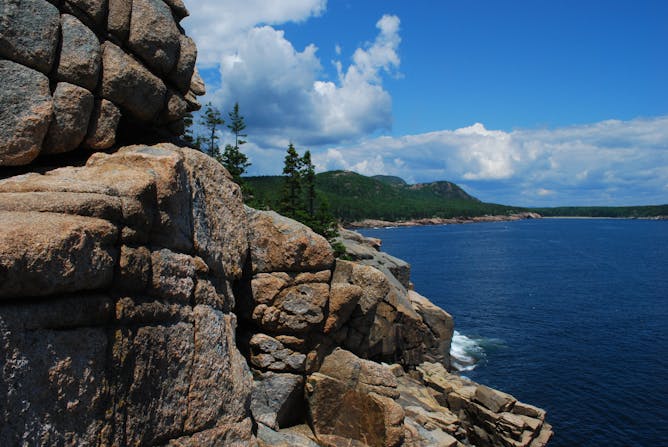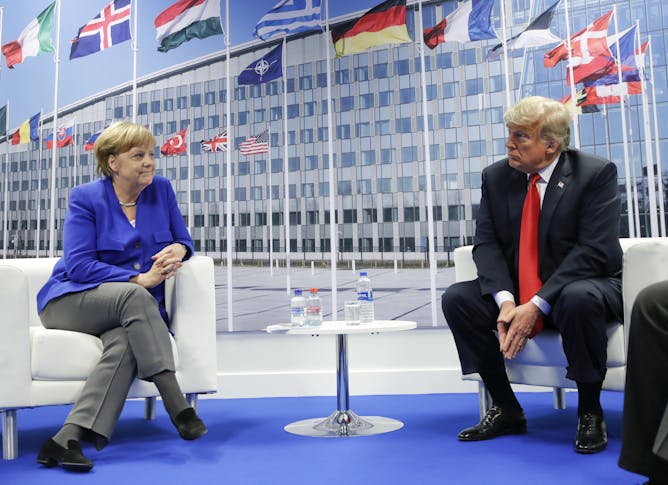|
|
|
Editor's note
|
|
Ground-level ozone is a harmful air pollutant that causes eye irritation and breathing problems, damages plants, and contributes to haze and smog. Regulations have cut ozone levels nationwide in recent decades, but a new study by economists David Keiser, Gabriel Lade and Ivan Rudik shows that it’s still a concern – even outside urban areas. Reviewing data from 33 national parks – places where travelers expect fresh air and clear vistas – they found, to their surprise, that the parks averaged nearly as many bad ozone days annually as major U.S. cities.
During a recent trip to Europe, President Trump suggested the European Union is one of America’s biggest foes, particularly in terms of trade. His words ignore the immense benefits Americans have reaped thanks to close economic and military ties maintained over the past six decades, writes Gregory Wright, an economist at the University of California, Merced. Treating the EU like a foe and going to war over trade will likely lead to a
future of lower living standards for Americans and more conflict, he argues.
The U.S. healthcare system is plagued by outdated records stored in different formats by different companies. Every doctor’s office, insurer, pharmacy, and other health provider has its own copies of patients’ files, with information that may be old, irrelevant or inaccessible. A new effort in the U.S. to fix those problems using blockchain technologies could learn useful lessons from Estonia and Sweden to improve medical
care.
|
Jennifer Weeks
Environment + Energy Editor
|

|
|
Top stories
|

A clear day at Acadia National Park in Maine.
John Marino
David Keiser, Iowa State University; Gabriel E. Lade, Iowa State University; Ivan Rudik, Cornell University
US national parks protect some of America's most spectacular outdoor settings. But new research shows that ozone pollution levels in the parks are roughly as bad as in major cities.
|

Trump and Merkel: Friends, foes or frenemies?
AP Photo/Pablo Martinez Monsivais
Greg Wright, University of California, Merced
The president, who called the European Union a 'foe' following a series of meetings in Europe, may not realize just how much Americans have gained from their relationship with Europe.
|

Finding ways to link health care data in a secure and confidential way.
PopTika/Shutterstock.com
Ana Santos Rutschman, Saint Louis University
The strengths of blockchain technologies could help address the weaknesses of health care systems to store and secure medical records.
|
|
|
Health + Medicine
|
-
Sherry Pagoto, University of Connecticut
Many gyms use free tanning beds to lure in new members who are eager to look and feel their best. But this, argues Sherry Pagoto, runs against the health lifestyle premise these gyms are advocating.
-
John Harris, University of Massachusetts Medical School
An autoimmune disease called vitiligo causes white spots to appear on the body, in some cases completely erasing an individual's pigmentation. But a new therapy is on the horizon.
-
Laurel Mellin, University of California, San Francisco
The relentless news cycle has many people feeling overwhelmed and stressed, wondering how to calm their lives and stay healthy. Here are some tips from neuorscience that may help.
|
|
|
|
|
|
Politics + Society
|
-
Stefanie Lindquist, Arizona State University
Donald Trump has lately been called "treasonous" by some; others say he's violated his oath of office. What are the president's Constitutional obligations -- and who holds the president accountable?
-
Brian Galle, Georgetown University
The NRA may fund political candidates but only with cash from U.S. donors. The group could face serious consequences if, as news reports allege, it broke laws and rules.
|
|
|
|
Trending on site
|
-
Shervin Assari, University of Michigan
Sex is an important part of life, but many people avoid it. Fear, former abuse and religion are common reasons, but you may be surprised to know how your overall health also leads to avoidance.
-
Kevin Knuth, University at Albany, State University of New York
About 5 percent of all UFO sightings cannot be easily explained by weather or human technology. A physicist argues that there's compelling evidence to justify serious scientific study and that the skeptics should step aside – for the sake of humanity.
-
Sara Jensen, Carthage College
In this professor's class, there are no calculators. Instead, students learn advanced math by talking, drawing pictures, playing with beach balls – and knitting.
|
|
Today’s chart
|
-

 |
Ian Anson
University of Maryland, Baltimore County
|
| | | |
| |
|
|
|
|
|
|
|